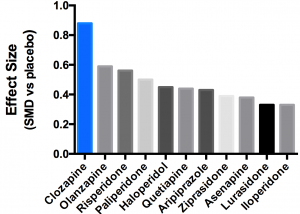Improving cognitive functioning in schizophrenia
Erik Messamore, MD, PhD
Aerobic exercise improves cognitive functioning in schizophrenia
In a comprehensive review of published research about the effects of exercise on cognitive functioning in schizophrenia, Joseph Firth and colleagues conclude that aerobic exercise offers significant benefits. The observed effects of exercise on cognition are greater in the more rigorously-designed studies or in the studies where the exercise program was run by a fitness professional such as a coach or trainer.
In these more rigorously-designed clinical studies, the effects on of exercise on cognitive functioning were about as strong as the effects of standard antipsychotic medications on schizophrenia symptoms. The effects of exercise on attention or social cognition were even stronger.
The full report is available as an open-access article.
Effect size: Understanding the magnitude of exercise benefits
In order to compare the results of different studies, Firth and colleagues examined each individual clinical study of exercise effects on cognition and converted each study’s results into a statistic called ‘effect size.’
The effect size statistic creates a standardized measure of effect that allows us to easily gauge the strength of an effect (or the magnitude of the difference between, say, a treated group and a control group). The effect size statistic helps us see if a treatment such as a medication, a psychotherapy, an exercise program etc is strong or weak.
Here is what they found:
- The average effect size across all studies, regardless of design quality, was 0.33.
- The average effect size for the more rigorously-designed randomized controlled trials was 0.43.
- The average effect size when the exercise program was supervised by a fitness professional was 0.47.
Let’s put these effect size numbers into perspective. Below is a graph that shows the effect size estimates for most of the modern antipsychotic medications.

Data are from Andrade, C. (2016). Antipsychotic Drugs in Schizophrenia: Relative Effects in Patients With and Without Treatment Resistance. J Clin Psychiatry 77, e1656–e1660.
Exercise effect size on cognition is on par with antipsychotic drug effect size on psychosis
Note that the effect size of antipsychotic medications for the treatment of schizophrenia is between 0.4 to 0.6. So, the effect of exercise on cognition is about as strong as the effect of antipsychotic medications on psychosis.
Impressive effects of exercise on attention and social cognition in people with schizophrenia
“Cognitive functioning” is a very broad concept. Within cognitive functioning, psychologists recognize domains such as: processing speed, working memory, problem-solving, verbal learning, visual learning, attention and social cognition. The meta-analysis results point to especially impressive effects of exercise on these last two domains: attention and social cognition.
Exercise, on average, boosted attention with an effect size of 0.66. And exercise improved social cognition with an effect size of 0.71.
An effect size of 0.7 is larger than the effect size of most of the antipsychotic drugs to reduce psychosis. This is a big deal because deficits in social cognition (the ability to interpret emotion or to correctly guess someone’s intentions based on facial expressions or body language) can be an especially disabling feature of schizophrenia for some individuals. Deficits in social cognition contribute to social withdrawal and disability.
A missing ingredient in schizophrenia treatment
If a drug were discovered that could improve attention or social cognition with an effect size of 0.6 to 0.7, that drug would be viewed as a breakthrough treatment and it would rise to the top of the list of recommendations for schizophrenia care. Every mental health clinic would be expected to make it available to their patients.
As human beings, we tend to overestimate the importance of rare things (like new drugs) and we tend to massively under-appreciate the potential for common things (like supportive family, aspirin, or exercise) to solve big problems. This report by Firth et al. should make us re-think or re-prioritize the role of exercise as part of schizophrenia care. It deserves to be taken seriously.